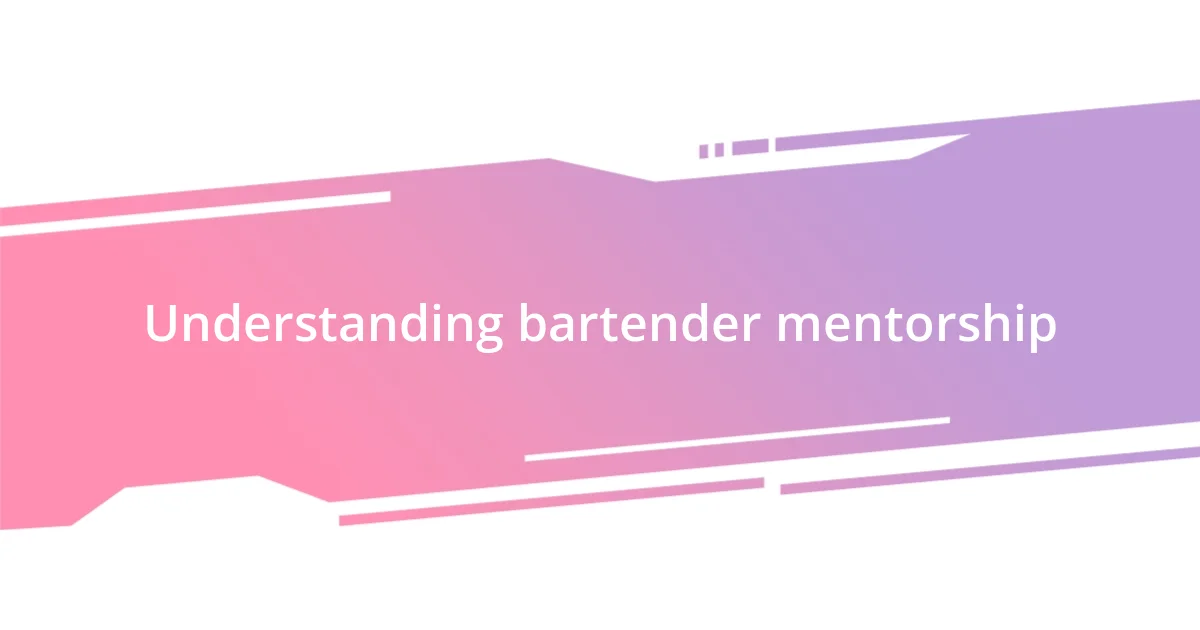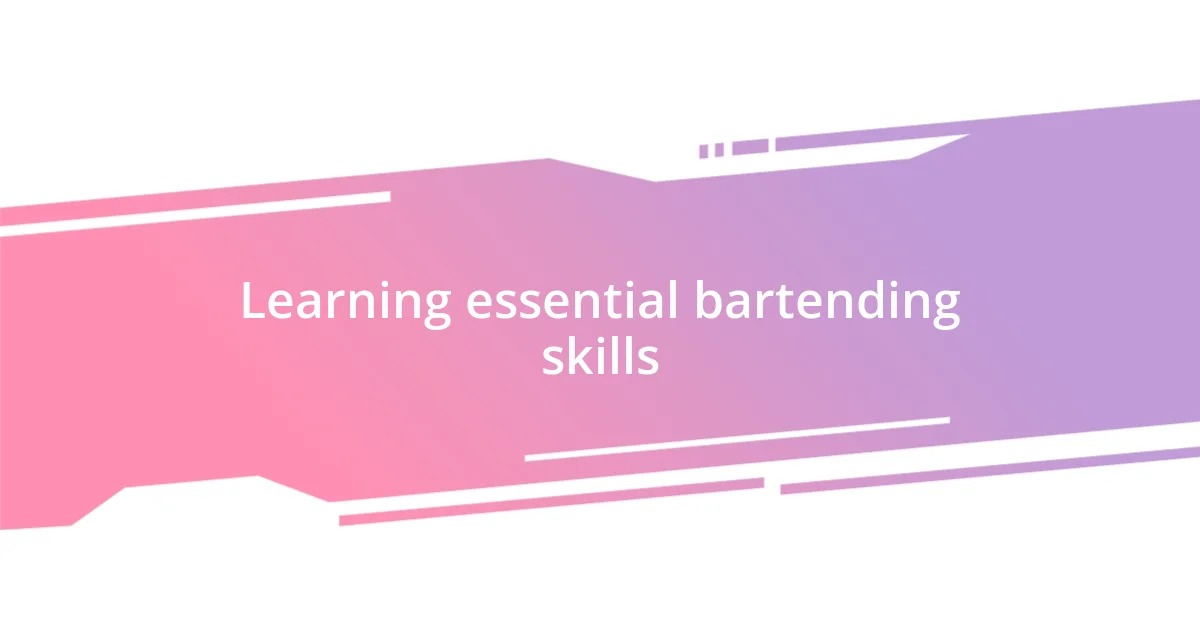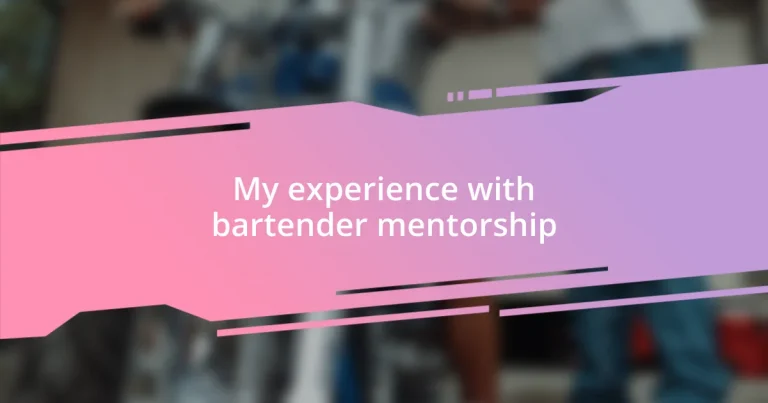Key takeaways:
- Bartender mentorship involves emotional support, skill development, and building lasting connections through shared experiences.
- Choosing the right mentor is crucial; compatibility in teaching style and shared values significantly impact the learning process.
- Networking within the bartending community fosters personal and professional growth, paving the way for new opportunities and collaborations.

Understanding bartender mentorship
Bartender mentorship is a unique relationship that thrives on shared experiences and knowledge transfer. I remember my first day in a bustling bar where my mentor took the time to explain not just the cocktails, but the essence of creating a welcoming atmosphere. How often do we overlook the importance of interpersonal skills in this craft? It’s about understanding how to read a room and connect with patrons.
One key aspect is the emotional support that comes from mentorship. Just as I once found myself overwhelmed during a busy shift, my mentor stepped in with reassurance and practical tips. This wasn’t just about mixing drinks; it was about handling pressure, finding balance, and realizing that mistakes are part of the learning curve. Can you recall a moment when you were unsure, and someone guided you through? Those moments shape our confidence.
Additionally, the mentorship relationship often evolves into a friendship, fostering a sense of community within the bartending world. I cherish the late-night talks with my mentor over the bar, where we’d swap stories about challenging customers and memorable shifts. It made me realize that mentorship is not just about imparting skills but also about building connections that can last a lifetime. Isn’t that what keeps us all invested in our craft?

Choosing the right mentor
Choosing the right mentor in bartending is crucial for your growth. It’s not just about finding someone with experience; it’s about finding someone whose teaching style resonates with you. I made the mistake of choosing a mentor solely based on their skill level, but I quickly learned that compatibility can greatly influence your learning process. Have you ever found yourself struggling to grasp a concept because the way it was explained didn’t click for you? That’s exactly what happened to me.
When I finally found a mentor who communicated with clarity and respect, my understanding of bartending flourished. This mentor took the time to assess my strengths and weaknesses, tailoring their guidance to meet my needs. It was a revelation! The learning didn’t feel forced; it felt like a natural exchange. I encourage you to look for someone who invests in your success and encourages open dialogue. After all, mentorship should feel like a partnership rather than a one-sided transaction.
Another important factor is shared values and work ethic. I once worked with a mentor who had a laid-back approach, which clashed with my ambition and desire for growth. In that environment, I felt stagnant. The right mentor should push you to reach your potential while aligning with your aspirations. Ask yourself: Are your goals compatible? A mentor should ignite your passion and inspire you, not hold you back from your dreams.
| Criteria | Importance |
|---|---|
| Teaching Style | Ensures concepts are comprehensible and tailored to your learning preferences. |
| Compatibility | Stronger mentor-mentee bond fosters a better learning environment. |
| Shared Values | Aligning aspirations cultivates motivation and ambition. |

Building a strong relationship
Building a strong relationship with a mentor is about more than just professional guidance; it’s creating a bond rooted in trust and mutual respect. I vividly recall moments when we both let our guards down—sharing not just bar tricks but personal stories. It was during those exchanges that I realized mentorship thrives on authenticity. When I felt comfortable enough to express my struggles, my mentor could offer tailored advice that truly resonated.
- Open communication is key; voice challenges and aspirations.
- Be receptive to feedback, even if it stings at first—it’s for your growth.
- Celebrate small victories together; it strengthens the connection.
- Make time for casual chats—often the best insights come from relaxed conversations.
- Be consistent in showing appreciation; gratitude goes a long way in deepening the relationship.
There’s something profoundly validating about knowing that your mentor sees your potential beyond your current skills. I remember being nervous before a big event, but my mentor’s words, “You’ve got this; I believe in you,” stuck with me. It’s this kind of encouragement that fosters an environment where both parties feel valued. Building that bond means investing time and effort on both sides, making the relationship a rewarding journey.

Learning essential bartending skills
Learning the essential skills of bartending sometimes felt like piecing together a puzzle. I remember my first night behind the bar; I was so focused on the basics—shaking, pouring, and mixing—that I didn’t realize how much of it was about rhythm. Did you know that creating a perfectly balanced cocktail requires attention to not just the ingredients, but also to the way they interact? It was my mentor who showed me that bartending is an art form; every drink tells a story and has its own unique character.
In my journey, I encountered various techniques that were instinctively honed through practice rather than theory. One night, while preparing a classic Old Fashioned, I fumbled the muddling. Instead of scolding me, my mentor laughed and saved the moment by showing me a trick to enhance the flavor without over-muddling. Reflecting on that experience now, I realize that sometimes, failure is the fastest way to learn. Have you ever found that a small mistake led to discovering a better method or approach? That’s the beauty of mentorship; it turns obstacles into opportunities.
Understanding the nuances of customer interaction was another vital skill I absorbed. I recall a particularly busy Friday when my mentor encouraged me to engage with patrons, not just serve them drinks. By sharing stories and learning about their preferences, I not only improved my service skills but also built lasting connections. It dawned on me how essential these interpersonal skills are in bartending. Do you think technical skills alone can sustain a successful bartending career? I learned that relationships often matter just as much as the mixology techniques you possess.

Gaining real-world experience
Gaining real-world experience in bartending was an eye-opening process for me. I still remember my first shift without my mentor’s watchful eye nearby—I felt both excitement and anxiety. That night, as I handled multiple orders while maintaining a smile, I realized that theory had its limits. It was in the heat of the moment, juggling drinks and patrons, that I truly learned what working behind a bar meant. Can you imagine the rush of crafting cocktails while people are eagerly waiting? It’s a skill set that no textbook can fully prepare you for.
One of my most memorable learning experiences came during a festival shift, where the pace was frantic. I had to rely on instinct more than anything else. My mentor had always emphasized the importance of preparation, but nothing could have prepared me for the sheer volume of orders. Through trial and error, I discovered how to prioritize tasks on the fly. Each successful drink served felt like a small victory—a reminder that I was growing. Have you ever faced an overwhelming situation where you surprised even yourself with what you could accomplish?
The real-world insights gained from bartending extend beyond just mixing drinks; they center on human connection. I recall a heartfelt moment with a customer who shared his story after I crafted a drink tailored to his taste. As we chatted, I felt the full weight of my role—not just as a bartender but as a confidant. Moments like those taught me that being a great bartender is as much about creating an experience for others as it is about the drinks. Do you think it’s possible to truly excel in this field without understanding the people we serve? For me, those connections transformed my perspective, reinforcing the idea that bartending is about much more than just shaking cocktails.

Networking within the industry
Building a strong network within the bartending industry is invaluable. During my first few months behind the bar, I quickly learned the importance of making connections. I remember meeting fellow bartenders at industry events where we shared tips and tricks, but also forged friendships that lasted beyond the bar. Have you ever experienced a moment when a simple conversation opened doors you never imagined? That’s exactly how I landed my second job; a chance encounter at a cocktail competition led to a recommendation that changed my path.
As I immersed myself in the community, I saw networking not just as a means to find job opportunities, but as a way to grow personally and professionally. One time, I attended a workshop led by a renowned mixologist. It wasn’t just the skills I gleaned from that night; it was the people I met, who later became mentors and collaborators. I’ve found that sharing experiences and advice often leads to unexpected growth. Isn’t it incredible how a simple exchange of ideas can ignite creativity?
Among all these interactions, I learned that it’s crucial to nurture relationships. I made it a habit to follow up after events, whether through social media or casual meet-ups. Over time, these connections evolved into a support system. I distinctly recall a colleague reaching out to me when they were struggling with a difficult customer. I coached them through it while sharing a few laughs, as we swapped our worst customer experiences. Strengthening these bonds not only enriches our work environment but also cultivates a sense of belonging in a sometimes chaotic industry. Have you ever wondered how far a few small gestures can go in establishing a robust professional network? Each connection genuinely added to my journey, and I’m grateful for that shared camaraderie.

Advancing your bartending career
Advancing in bartending is a journey filled with opportunities for growth and self-discovery. I fondly recall when I decided to delve into mixology competitions, thinking it might be a fun way to hone my skills. The thrill of crafting unique drinks under pressure was invigorating; I felt a rush every time I created something that impressed judges. Have you ever entered a competition that pushed you to excel in ways you never thought possible? Those experiences not only refined my technique but also boosted my confidence behind the bar.
As I ventured further into my career, education became my ally. I enrolled in advanced bartending courses that offered both technical skills and much-needed insights into spirits. I remember sitting in a class about the intricacies of whiskey, fascinated by the distillation process and regional variations. It was a game-changer for me. Do you think investing in education can elevate your craft? For me, it reinforced how understanding the ‘why’ behind my choices made me a better bartender and storyteller.
In every job I’ve held, I sought out leadership roles, whether formally or informally. One of my most rewarding experiences was training new staff. I found joy in sharing the knowledge I’d gained, much like my mentor had done for me. It brought a sense of fulfillment that I wasn’t just perfecting my own skills but also helping others find their footing. Have you ever mentored someone and felt that rush of pride as they grew? Watching them thrive became a reminder that advancing my career was also about lifting others along the way.














